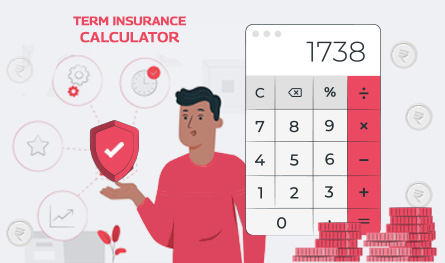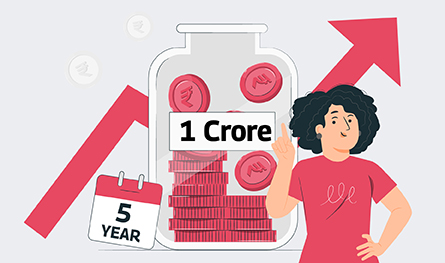Income Tax Act Section 10 – Allowances, Exemptions, and Process to Claim
.png)
Every individual in India with a taxable income has to pay income tax on their annual earnings. To lower the burden of tax on individuals, the government presents certain deductions in the form of exemptions under different sections of the IT Act of 1961. One such section of Income Tax is section 10, which discusses such exemptions and their terms and conditions. In this post, let’s understand these exemptions under section 10 of the IT Act.
.png)
Before discussing exemptions under section 10, let’s talk about income tax returns or ITR.
What is an Income Tax Return (ITR)
ITR or Income Tax Return is a form that a taxpayer has to submit to the income tax department of India offering information on their income and their tax liability. As per the tax liability of an individual, they pay the amount of tax to the IT dept. This tax is calculated on the income of the taxpayer. However, if taxpayers pay excess tax, they can receive a refund from the IT department by filing an ITR.
What Is Section 10 Of the Income Tax Act?
Section 10 of the Income Tax Act 1961 consists of various deductions available to taxpayers, which they can avail of at the time of paying income tax. This section emphasizes the income sources that don’t form a part of the total income of the taxpayer.
Exemptions Available Under Section 10
There is a wide list of exemptions available u/s 10 of the Income Tax Act 1961 as listed under:
1. Exemptions under Section 10(1)
Section 10(1) exempts income earned from agricultural land located in India, including rent/revenue earned from the land, earnings from cultivation, sowing, weeding, pruning, etc., revenue earned from the sale of agricultural produce, and revenue earned from farm building for agriculture.
2. Exemptions Under Section 10 (13A)
The (13A) clause of section 10 of the IT Act covers HRA or House Rent Allowance. As per this clause, the HRA part of your salary that you receive to cover your cost of accommodation or house rent is exempted from taxation. These exemptions are available with some exclusions included in Rule 2A of Section 10 (13A).
The deduction under section 10 (13A) applies to the least of the below amounts:
- Actual amount of HRA received
- 50% of [basic salary + DA] for residents of Delhi, Mumbai, Chennai, Kolkata
- 40% of [basic salary + DA] for residents of other cities, or
- Actual rent paid (-) 10% of basic salary + DA
3. Exemptions Under Section 10 (5)
Clause (5) of section 10 discusses the exemptions of leave travel allowance (LTA) that taxpayers can avail of. Employees who incur costs on domestic travel, including air/train/bus fare, can avail of the limited LTA exemptions within the salary coverage offered by your employer. However, LTA doesn’t cover other expenses such as hotel stays, food, or transport costs within a city. Let’s take an example: if your employer offers you an LTA of INR 40,000 and you incur travel expenses worth INR 30,000. You can avail of the exemption on the amount incurred on your travel, which is INR 30,000, while the remaining INR 10,000 will be taxed.
4. Exemptions Under Section 10 (26)
Clause (26) of section 10 allows tax exemption to people of scheduled tribes belonging to the Indian states of Arunachal Pradesh, Nagaland, Manipur, Mizoram, and Tripura.
5. Exemptions Under Section 10 (14) (I)
As per section 10 (14) (I), you are eligible for exemptions for costs incurred on research, travel, conveyance, etc., of your employer’s business.
6. Exemptions Under Section 10 (11)
Clause (11) of section 10 of the Income Tax Act 1961 allows exemptions on the interest amount earned from the provident fund after retirement. Also, it provides exemptions on payments made from SSA or Sukanya Samriddhi Account.
7. Exemptions Under Section 10 (34)
Clause (34) of section 10 includes exemptions earned from dividends by investing in an Indian company for up to INR 10,000 only. Any amount exceeding that requires you to pay tax.
8. Exemptions Under Section 10 (26AAA)
If you are a resident of Sikkim earning there or through security dividends/interest, etc., you can avail of exemptions on that part of your earning u/s 10 (26AAA)
9. Exemptions Under Section 10 (38)
Clause (38) of section 10 allows taxpayers exemption on capital gains over the long-term using equity shares of equity-oriented mutual funds. However, you must pay the tax on securities transactions.
10. Exemptions Under Section 10 (23C)
Section 10 (23C) allows tax exemptions for educational or medical institutions whose overall yearly income does not exceed INR 5 crore.
11. Exemptions Under Section 10 (37)
Section 10 (37) allows exemptions on capital gains caused by compulsory acquisition of urban agricultural land.
12. Exemptions Under Section 10 (10A)
Government employees can earn tax exemption under section 10 (10A) on the amount earned from accrued pensions.
13. Exemptions Under Section 10 (10D)
Section 10 (10D) allows taxpayers to avail of an exemption for the income earned from a life insurance policy or bonus.
14. Exemptions Under Section 10 (35)
Section 10 (35) of the Income Tax Act allows you to gain exemption from the sale of definite mutual fund units.
General Provident Fund (GPF) exemption under Section 10 of the Income Tax Act
Section 10(11) and 10(12) of the Income Tax Act allow taxpayers to avail of an exemption of GPF amount of INR 2.5 lakh.
1. Exemption on Internet allowance u/s 10 of Income Tax Act
Section 10 clause (14) of the Income Tax Act provides tax exemption on internet allowance offered by employers.
2. Exemption of Food allowance under Section 10 of the IT Act
Clause (14) of Section 10 offers an exemption of INR 26,400 in a year on tax for food allowance provided by employers
3. Maximum Limit of Exemptions Available Under Section 10
The total amount of exemption under section 10 of the IT Act is up to INR 2.5 lakh for taxpayers below the age of 60 years. This limit is INR 3 lakh for taxpayers above 60 years and below 80 years of age, while it is INR 5 lakh for super-senior citizens of 80 years and above provided, they are Indian residents.
The Process to Claim Exemptions Under Section 10
To claim a tax exemption u/s 10 of the Income Tax Act, you may simply file an ITR or income tax return.
Section 10 Allowances
Total exemptions that a taxpayer can earn under the Income Tax Act of India are mentioned under section 10, including travel, gratuity, rent, education, children’s allowance, and more.
Does Income Tax Allow Exemption of Leave Encashment?
Your employment considers whether your leave encashment is exempted under income tax or not. If you are a central or state government employee, the income you earned from leave encashment at the time of resignation will not be taxable.
On the other hand, the government considers income from leave encashment for private sector employees after retirement/resignation as taxable ‘Income from salary’. However, they can avail of exemptions u/s 10(10AA) of the Income Tax Act and may pay tax on the amount that is remaining after exemption.
So, leave encashment earned as part of one’s employment is completely taxable and is considered a part of ‘salary income’ for private job holders.
FAQs on Section 10 Of the Income Tax Act
Sec 10 is a section under the Income Tax Act of India that contains all the exemptions that an individual can avail of.
Several exemptions are available under section 10, which are mentioned in the post above.
Clause 21 of section 10 of the IT Act allows income tax exemptions for income earned from an Approved Scientific Research Association, including grants, donations, etc.
No, only a part of the HRA under Section 10 (13A) of the Income Tax Act provides HRA exemptions with some limitations.
You can get an exemption on income received on voluntary retirement under section 10 (10C)
Tax benefits on the maturity amount of a life insurance policy are discussed under section 10 (10D)

Author Bio
Paybima Team
Paybima is an Indian insurance aggregator on a mission to make insurance simple for people. Paybima is the Digital arm of the already established and trusted Mahindra Insurance Brokers Ltd., a reputed name in the insurance broking industry with 17 years of experience. Paybima promises you the easy-to-access online platform to buy insurance policies, and also extend their unrelented assistance with all your policy related queries and services.
Other Life Insurance Products
Latest Post

Let’s be honest – life insurance planning isn’t exactly someone’s weekend hobby. It is the financial equivalent of flossing: we understand its importance, but we tend to put it off. But somewhere between balancing work and life, you might realise you need to have a solid plan in place – just in case.


If you think of life insurance, chances are you are picturing something people buy in their 30s or 40s. But what if you are 65 or older and just getting started? The good news is that you are never too late. Whether you are thinking of easing the financial burden on your family, covering final expenses, or simply leaving behind a legacy, there are life insurance options tailored just for you.
This article will be a guide to life insurance for senior citizens above 65 years, explaining why it is important, the type of insurance options, and how to get the right policy for you.


Health insurance plans are purchased with the hope of medical protection in times of need. However, sometimes it ends up being a source of surprise and disappointment. This mostly happens when people rush to buy health insurance plans, often overlooking essential aspects. Ignoring waiting period clauses, misunderstanding exclusions, and being unaware of sub-limits can lead to unwanted problems in the future.


If you are looking at investment policies offering INR 1 Crore in 5 years, we talk about some excellent plans in this post to help you choose the best one and reach your goal. However, it is important not to get swayed. Doing proper research and taking advice from financial or insurance advisors is important. Learn about such investment plan in this post.

The last few years have made it very clear that having health insurance is essential for everyone. Whether you are a young professional or a senior citizen, are single or have a family to support, health insurance cannot be ignored. Keeping this in mind, health insurance companies offer comprehensive plans that suit people with varied insurance needs.




